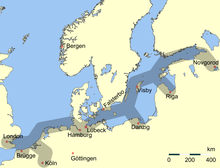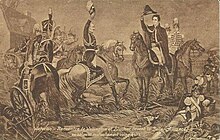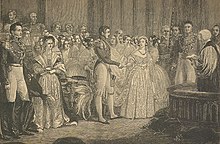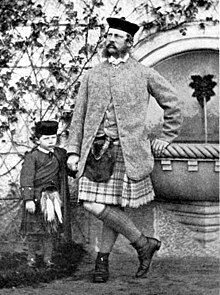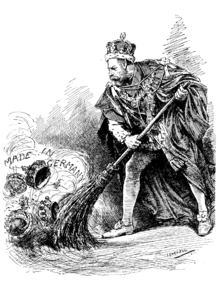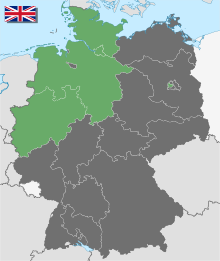British-German relations

|
|
|
|
|
| Germany | United Kingdom |
The states of Germany and Great Britain are both members of the Council of Europe , the Organization for Security and Cooperation in Europe (OSCE), the OECD and NATO . Great Britain was - like Germany - a member of the European Union for several decades . However, it decided against joining the euro zone and against abolishing border controls by joining the Schengen area .
Great Britain has the British Embassy in Berlin and consulates general in Düsseldorf and Munich . Germany is represented by the German Embassy in London . A consulate general exists in Edinburgh, Scotland .
history
root
As early as the 5th century AD, Anglo-Saxons immigrated from the north German lowlands to Great Britain, which had previously been abandoned by the Roman troops . This explains why today's English language has its roots in the Old English of the Germanic tribes of the Angles , Saxons and Jutes who immigrated at the time . Thus, the English language has common roots with Low German and Frisian , whereby the English language like German and partly Low German developed into an independent language.
middle Ages
In the Middle Ages, British-German dynastic relationships were not very common. So the house of Wessex preferred z. B. Marriage ties with France. Two binationally relevant weddings can be recorded for the 12th century: In 1114, Princess Mathilde of England married the Holy Roman Emperor Henry V and in 1168, Duke Henry the Lion married Princess Mathilde Plantagenet .
The English King Richard the Lionheart was imprisoned in the Holy Roman Empire from 1192 to 1194 and only came to the Hohenstaufen Emperor Henry VI after the payment of ransom and the oath of allegiance . free again.
Richard's nephew Richard of Cornwall became the Staufer's brother-in-law in July 1235 through the marriage of Frederick II to his sister Isabella . In the double election of a Roman-German king in 1256/57 after the death of Wilhelm von Holland (1256), the English party of the German electors ( Cologne , Mainz , Palatinate ) elected Richard as Roman-German king. He was crowned in Aachen , but could hardly assert himself more than his rival King Alfonso of Castile . He stayed in Germany only four times for a short time (most recently in 1269).
Commerce and Hanseatic League on the Thames
Since the early 11th century, Rhenish merchants can be found in London who mainly traded in wine . In 1175 some Cologne merchants obtained trade privileges or letters of protection through Heinrich II and founded a joint branch on the Thames. This building, the Guildhall , translated as guild or guild house, served the merchants of the merchants as a meeting place, warehouse and occasionally for residential purposes. Around 1238 and 1260 Heinrich III. the privileges of the merchants confirmed, they now applied to all German Hanseatic merchants in London. The main goods of the German merchants changed, instead of the wine came mainly grain and cloth that were imported to England .
In the 15th century, the aspiring English trading bourgeoisie tried more and more to break the Hanse's prerogatives in Baltic trade . When English ships were seized and confiscated in the Sound in 1468 with the help of Danzig capers chartered by the Danish Crown, Edward IV had the Guildhall storm and plundered in the spring of 1469. The merchants were temporarily imprisoned and had to be liable for the damage caused in the sound with their property. That was the occasion for the Hanso-English War , which ended with the Peace of Utrecht in 1474 and confirmed the rights of the Hanseatic League. After this peace agreement, the area adjacent to the Guildhall was given to the merchants by the English king. This area was surrounded with a strong wall and called Steelyard or Stalhof . The site had its own crane , its own farm and residential buildings and a garden.
Since the revocation of trade privileges in 1552 by King Edward VI. Heinrich Sudermann from Cologne , from 1556 to 1591 syndic of the Hanseatic League, also tried diplomatically with Edwards' successors to stabilize and save the Stalhof for the Hanseatic League. When the conflict over cloth exports increased at the end of the 16th century and England was at war with the German Emperor, Queen Elisabeth ordered the expulsion of the Hanseatic merchants from England on January 13, 1598 with effect from January 24, whose trade privileges she revoked, as well the closure and confiscation of the Stalhof.
Long 19th century
English, Germans and Napoleon
In the fight against revolutionary France and in the Napoleonic Wars , the British and various German states were often allies. However, the coalitions often varied, as Germany was divided into many different states (territorial “patchwork carpet”). At times, as allies of France , German states were also enemies of Great Britain (especially the smaller German states) or had to abstain from hostilities after severe defeats (especially Prussia and Austria ).
In the First Coalition War (1792–1797) the states of the Holy Roman Empire of the German Nation - u. a. Prussia and Austria - on the side of the English against France. Ultimately, revolutionary France was largely able to prevail against the allied powers.
The Second Coalition War , also the First Napoleonic War (1798 / 99–1801 / 02), was waged by an alliance around Russia , Austria and Great Britain against the revolutionary France, which was successful in the first coalition war. The defeat of the Allies was indirectly responsible for the complete reorganization of the Holy Roman Empire through the Reichsdeputationshauptschluss (1803). Prussia under its new King Friedrich Wilhelm III. remained neutral in this conflict.
The Third Coalition War , also known as the Second Napoleonic War , took place in 1805. It saw some German states (especially Württemberg , Bavaria and Baden ) already on the side of the rising power of Europe, the French Empire . Opponent was an alliance around Great Britain, Russia, Austria, Sweden and Naples . The result of the Third Coalition was that Great Britain was now the dominant power at sea. In continental Europe, Napoleon Bonaparte dominated . This fundamentally restructured the situation, especially in Germany. He created the Confederation of the Rhine (as a kind of French "satellite states"), whose members left the Holy Roman Empire. Thereupon Emperor Franz II laid down the crown of the empire (1806). Napoleon had thus forced a turning point in German history.
In 1806 Napoleon set up the continental barrier (an economic blockade ) against Great Britain, which all German states supported or had to support and which lasted until 1814. In addition to some positive effects for German industries, the blockade often had fatal consequences for German trade with Great Britain, which in German countries increasingly led to smuggling, social unrest and falling acceptance of Napoleonic rule.

The Fourth Coalition War , also the Third Napoleonic War , in 1806 and 1807 took place between France and its allied states such as the German members of the Rhine Confederation on the one hand and mainly Prussia and Russia (later expanded to include Great Britain and Sweden) the other side instead. The old Prussian state collapsed after the double battle of Jena and Auerstedt in October 1806. The court fled to East Prussia . The main burden of the war was now on Russia. After the decisive defeat by Napoleon in the Battle of Friedland , the Peace of Tilsit ended the war. Prussia lost almost half of its territory, had to pay high war indemnities and sank to the status of a less powerful state. Napoleon, on the other hand, was at the height of his power.
The Fifth Coalition War or Austro-French War of 1809 describes the conflict between Austria, supported by Great Britain, and the French Empire with its German allies in the Rhine Confederation. The conflict ended with the defeat of Austria.
The Wars of Liberation (1813-1815) against Napoleon's rule over Europe gradually united more and more states in an anti-French coalition. They followed Napoleon's defeat in the Russian campaign in 1812 . Initially, Russia and Prussia formed a coalition. Later joined u. a. Great Britain and Austria. More and more German states of the Rhine Confederation also switched to the anti-French camp (e.g. Bavaria with the Treaty of Ried on October 8, 1813, shortly before the Battle of Leipzig from October 16 to 19, 1813). A famous - if not authenticated - quote on German-British relations at that time comes from Arthur Wellesley, 1st Duke of Wellington from the Battle of Waterloo : "I wish it was night or the Prussians would come!"
The Napoleonic era finally ended with the victory of the European states - including most of the German states and Great Britain - over France and with the reorganization of Europe and the attempt to restore pre-revolutionary conditions at the Congress of Vienna (1814–1815).
Personal union Great Britain and Hanover and other connections
From 1714 to 1837 there was a personal union between Great Britain and Hanover . During this time the government of the Hanoverian state took place from the German Chancellery in London . The personal union ended with the accession to the throne of Queen Victoria , as the Kingdom of Hanover did not provide for female succession. But even after the end of this union, the dynastic connections to Germany did not break off. Victoria was the daughter of Victoire von Sachsen-Coburg-Saalfeld and married Albert von Sachsen-Coburg and Gotha .
Victoria's death ended the reign of the House of Hanover on the British throne. The rule of the House of Saxe-Coburg and Gotha began with their son, King Edward VII . His son Georg V was the cousin of the German Emperor Wilhelm II - the two monarchs ultimately faced their countries as enemies in the First World War .
Forging an Empire and Bismarck
The founding of the German Empire in 1871 caused a massive disruption of the balance of power in continental Europe sought by Great Britain ("balance in Europe, rule of Great Britain on the oceans"). In the War-in-Sight Crisis (1875), the father of German unification, Chancellor Otto von Bismarck , explored how the European powers would react to a further armed conflict between Germany and France. In Germany, such a preemptive strike was being considered as France was rearming. In addition to Russia, Great Britain also signaled that it would not tolerate any further increase in power of the German Empire in the future. Bismarck recognized the incalculable risk of a two-front war and declared the new power in the center of Europe to be “saturated” (without further territorial claims). With his alliance policy - the "game with five balls" - Bismarck succeeded for the time being in preventing direct opposition to the United Kingdom. However, even during its chancellorship, the island state was hardly involved in the alliance system it orchestrated. Furthermore, this system was too complicated to be kept under control by its successors.
The British hopes, on the other hand, to exercise their own influence on the newly formed German Reich, were not fulfilled. Victoria , the daughter of Queen Victoria and the wife of Crown Prince Friedrich Wilhelm , remained isolated as an Englishwoman at the Berlin court . The competition from German exports led to the Merchandise Marks Act 1887 in 1887 , which stipulated that the country of origin must be clearly indicated on goods. “ Made in Germany ”, however, soon worked like a seal of quality, and the negatively intended product labeling had the opposite effect. The gradual deterioration of the relationship was also revealed on the occasion of the cancer of the Crown Prince and later Emperor Friedrich III. during its treatment by German and British doctors.
Growing tensions - Wilhelm II .: "an emperor in a china shop"
This constellation encountered an extremely difficult character with Wilhelm II, who had British ancestors through his mother. In 1888, the 29-year-old ascended the throne and dismissed the “pilot” Bismarck just two years later. The emperor strove for a “personal regiment” and sought to give the German Reich a “ place in the sun ”. He was often contradicting and unpredictable.
After the Helgoland-Zanzibar Treaty of 1890, which was perceived as unsatisfactory , the Pan-German Association was founded, whose expansionist efforts were suspiciously pursued in Great Britain. Wilhelm's Krüger-Depesche (1896), with which he interfered in British colonial policy in South Africa, the Daily Telegraph affair of 1908 with a publication of unfortunate statements by the Emperor and the First, had a particularly poisonous effect on the German-British relationship Morocco Crisis 1904–1906 as well as the Second Morocco Crisis 1911 (in which the British saw their sea route to India threatened by a possible German naval base in Agadir - near Gibraltar ). The naval laws of the German Empire of 1898/1900 hit the heart of British interests . Although it was clear to the Germans that they would not be able to catch up with the British fleet in the foreseeable future, a " risk fleet " was to be created, the size of which should be such that Great Britain would have to take it into account in its strategy. This German policy triggered the German-British naval arms race . Germany envisioned a situation in which Germany would be the hegemonic power in Europe and equilibrium would prevail on the world's oceans.
As part of the European race for Africa , the so-called Angola Treaty was signed in 1898 : In the event that Portugal should need money, Germany and Great Britain agreed on a joint loan, for which the Portuguese colonies were provided as collateral. In the event of the expected insolvency of Portugal, Central Angola (Inner Angola) should then fall to Great Britain, while North, South and West Angola to Germany (as well as Northern Mozambique and Portuguese Timor to Germany, Southern Mozambique to Great Britain). In return, Germany refrained from supporting the Boers in the Boer Wars against Great Britain. However, the agreement was never implemented and was undermined in 1899 by the extension of the British "guarantee of protection" ( Windsor Treaty ) for Portugal and all of its possessions.
In summary, it can be said that German policy led to the abandonment of English splendid isolation , which was manifested in the Entente cordiale with France of 1904 and the Triple Entente with France and Russia of 1907. This created the rough starting point for the First World War. Although there were signs of relaxation in the bilateral relationship as a result - the thread of conversation did not break and in the Balkan Wars of 1912/1913 there was certainly also German-British cooperation - a fundamental clarification of the relationship could not be achieved until 1914 .
British attempts to mediate were also made in the July crisis of 1914 after the assassination attempt on the Austrian heir to the throne in Sarajevo . British Foreign Secretary Edward Gray et al. a. an ambassadors conference. King George V also sought a peaceful solution together with Prince Heinrich of Prussia . The outbreak of war could no longer be prevented. The trigger for the British entry into the war was the German violation of Belgian neutrality, the guarantor of which Great Britain acted.
First World War
The First World War became the European " great catastrophe of the 20th century " and was associated with unspeakable horror for both Germans and English.
With the Niedermayer-Hentig Expedition (1914–1916), the German Reich tried to pull Afghanistan into war on the side of the Central Powers . This could u. a. a threat to the adjacent British India - the "crown jewel" of the Empire - represented. However, Afghanistan, which was "squeezed in" between the Russian and British empires, preferred to continue its policy of neutrality towards the two great powers.
The Germans also became active in the “backyard” of Great Britain, in Ireland, which was striving for independence: As part of the preparation for the Irish Easter Rising against the British in 1916, the Germans planned (following the motto “The enemy of my enemy is my friend”), Irish British prisoners of war who had agreed to transport to Ireland and land around 40,000 French and Russian booty rifles with an auxiliary ship on Good Friday in Ireland ( County Kerry ). The landing failed because the time and place were not well coordinated.
During the war, anti-German sentiment in Great Britain continued to grow. In 1917 the pressure on the ruler had become so strong that the house "Saxe-Coburg and Gotha" was renamed House Windsor . Associated with this was the royal family's renunciation of all German titles.
Interwar period
At the end of the war, the British Prime Minister David Lloyd George promised his people to impose a hard peace on the defeated German Reich. However, during the Paris Peace Conference in 1919 , the British delegation took a rather moderate negotiating position compared with France. The disagreements between the allies about the treatment of the former enemy ran through much of the post-war period. The rather mediating British attitude was shown among other things. a. at the Genoa Conference in 1922 and the Franco-Belgian occupation of the Ruhr in the following year. Under pressure from the USA and Great Britain, the German reparations were lowered in 1924 with the Dawes Plan . In the negotiations on the Young Plan of 1929, however, the British and the French insisted that the annual payment should remain high. After all, an end to the payments was set for the first time - but not until 1988. The actual end of the reparations payments came with the Lausanne Conference in 1932. At this point, the Weimar Republic had already come to an end and the following year Adolf Hitler came to the Power.
The establishment of the Third Reich unsettled British politics and an increase in defense efforts was considered. However, the implementation of these plans was initially hampered by a lack of funds. Although Germany announced the introduction of general conscription against the provisions of the Versailles Treaty in March 1935 , and despite the armament of the Wehrmacht to a base of 550,000 men, Great Britain concluded the German-British naval agreement with Nazi Germany in June 1935 , which increased the size of the German navy Fixed 35% of British strength, also to avoid a disastrous arms race like the one before the First World War. Great Britain also tolerated Hitler's occupation of the Rhineland (1936) for various reasons .

The highlight of the British appeasement policy followed in 1938, when as part of the Munich Agreement United Kingdom, France and Italy, the assignment of the majority German populated Sudetenland approved by the German Reich to have even included in the negotiations without Czechoslovakia. The British Prime Minister Neville Chamberlain hoped that the strategy of appeasement would preserve European peace and integrate the regaining strength of Germany into a system of collective security. At least a war should be postponed until the English armaments were ready for armed forces.
In return, Chamberlain expected the Germans to resolve future conflicts only in cooperation with the other European powers. A short time later, in March 1939, when Hitler finally dropped the mask of integrability and reliability with the “ smashing of the rest of the Czech Republic” (cf. Hitler's statement of November 1938: “We don't want any Czechs”), the British became it was clear that their German policy had failed across the board. On March 31, the British-French declaration of guarantee was made for Poland, which Hitler had chosen as the next target of his aggression. However, the dictator did not take this declaration of the "effeminate democracies" seriously. This turned out to be a mistake, because both Western powers declared war on the German Reich after the Nazi attack on Poland in September.
Second World War
After the Hitler-Stalin Pact of August 24, 1939, Poland was divided between Germany and the Soviet Union . During the seated war that followed and until the German campaign in the west in May 1940, neither the French nor the British undertook major operations on the main front. The German occupation of Denmark and Norway in the " Operation Weser Exercise " (April to June 1940) could not be prevented by British intervention (e.g. battle for Narvik ). (The British had successfully occupied Iceland and the Faroe Islands in April 1940.) As a result of this military defeat, Chamberlain had to give up his post of Prime Minister to Winston Churchill .
The French and British did not withstand the French campaign, which turned out to be a “ blitzkrieg ”, which the Germans waged by breaking Belgian and Dutch neutrality and surprisingly including the difficult terrain of the Ardennes . However, the British succeeded in rescuing most of their expeditionary corps back to the island as part of Operation Dynamo during the Battle of Dunkirk , which was an important prerequisite for the continuation of the war even after France left.
After the French surrender, Hitler expected an understanding with Great Britain soon, but had not counted on Churchill's determination. This swore his compatriots to unconditional resistance against the Germans (see also his blood-sweat-and-tears speech ) - although Great Britain was initially facing the enemy alone. In fact, however, the Germans did not succeed in breaking the British resistance in the Battle of Britain and creating the conditions necessary for an invasion. Initially, the war was characterized by tactical point bombing on both sides . The first city and its civilian population to be accidentally bombed was Mönchengladbach on May 12, 1940. After the German bombing of Rotterdam in 1940 and the Battle of Warsaw (1939) , Churchill ordered the bombing of German cities. This ended the point bombing on both sides and area bombing began. With these air strikes, both sides intended to terrorize the civilian population, both sides speaking of "retaliatory measures". (E.g. Hitler's famous quote from the speech of September 4, 1940: "And if they [the British] declare that they will attack our cities on a large scale - we will erase their cities: we will put an end to these night pirates." so help us God! ", air raids on Coventry , The Blitz and Baedeker Blitz ).
In retaliation for such attacks and since the British did not have a land front with the Germans, the Royal Air Force increasingly began to bomb German cities. The strategy of moral bombing was consciously aimed at hitting civilian targets in order to induce the German population to give up or to revolt against the National Socialists. However, the consequences were (as before with "The Blitz") that the civilian population was shaped by perseverance. Both English and German cities irretrievably lost a large part of their centuries-old cultural heritage in the nights of bombing and firestorms .
Hitler had planned to first make peace with the British in order to be able to attack the Soviet Union in a war of annihilation without having to wage a two-front war. When this proved impractical, German troops crossed the German-Soviet border on June 22, 1941 as part of Operation Barbarossa without a declaration of war. Great Britain was thus freed from its isolation. At the latest with the entry of the United States into World War II through the German declaration of war on the country on December 11, 1941, the Allies gained strategic advantages. However, it would take until September 1943 ( invasion of Italy ) or June 1944 ( landing in Normandy ) before the Western Allies were able to re-establish a front against "Hitler's Germany" on the European mainland, as Josef Stalin did again and again had requested. By the end of the war, the British troops plunged deep into the German Empire and, with great losses, contributed to the victory over the Greater German Reich and to the liberation of Germany from National Socialist rule.
Post War and Cold War
The unconditional surrender of the Wehrmacht came into effect on May 8, 1945. At the Potsdam conference , which was important for post-war order , Churchill took part alongside Stalin and the American President Harry S. Truman as one of the “Big Three”, but was replaced by Clement Attlee during the conference due to his domestic election defeat .
Churchill raised moral concerns about the expulsion of the Germans and the like during the deliberations . a. from what was then Czechoslovakia and the areas required by Poland east of the Oder-Neisse line ; Ultimately, however, the “orderly and humane transfer” of German “parts of the population” from the eastern areas was decided at the conference (in practice, the expulsion often turned out to be anything but humane, especially at the beginning).
The British zone of occupation comprised the north-western part of the defeated German Empire (today's federal states of Hamburg, Lower Saxony, North Rhine-Westphalia and Schleswig-Holstein). In addition, the former capital of Berlin was divided into four sectors - the British controlled the British sector.
To support the German economy, the British soon agreed to merge their zone of occupation with the American zone to form the bizone (from January 1, 1947), while the French still had reservations and continued to administer their zone separately. In the context of the looming Cold War, it became more and more difficult to come to an agreement with the Soviets on some form of joint approach. The threat posed by communism soon proved to be the "midwife" of the Federal Republic of Germany , which was formed from the three western zones on May 23, 1949. The Occupation Statute regulated relations with the occupying powers, whose highest representatives were called Allied High Commissioners . From 1949 to 1955 Brian Robertson , Ivone Kirkpatrick and Frederick Millar served as British High Commissioners. With the German Treaty, the young state regained its sovereignty and the High Commissioners were replaced by ambassadors. However, some special rights of the victorious powers remained.
In a visionary speech in 1946, Winston Churchill proposed “ a kind of United States of Europe ” in order to be able to integrate Germany into the European family of nations and to secure European peace. Even back then, however, he insisted that France and Germany should do pioneering work on this path. At that moment, too, the island position, the earlier “ splendid isolation ” and the Commonwealth of Nations of Great Britain were not forgotten. However, this should not prevent the British from working towards a reconciliation with the former enemy of the war: the first German-British town twinning was established as early as 1947 . (In the post-war period Coventry entered into partnerships with the German cities of Kiel and Dresden, which were also destroyed by the war.) In 1949, Lilo Milchsack and other German citizens founded the forerunner of the German-British Society in Düsseldorf , which was supposed to promote mutual understanding through annual Königswinter conferences .
In the course of the integration of the FRG into the West , it also joined the North Atlantic Alliance in 1955 and has therefore been a NATO partner of the British since then. However , the British continued to struggle with European integration and did not join the European Economic Community until 1973 . Even as a member state, the kingdom repeatedly turned out to be a difficult partner, often viewed with great skepticism about further unification steps (keyword: Margaret Thatcher's “I want my money back” and the British discount granted to the European institutions).
That even more than 40 years of peace had not been able to dispel all British concerns about Germany is shown very clearly in the fact that Thatcher in 1989 was extremely skeptical of the impending German reunification . Your image of the poor national character of the Germans, which was shaped by the German-British antagonism of the 19th and 20th centuries and National Socialism , came to light in the summer of 1990 through the Checkers affair .
Great Britain and the reunified Germany
After German reunification in 1989, the British slowly changed their image of Germany. The new and dynamic capital of Berlin attracted many English people. The 2006 soccer World Cup , whose open and relaxed atmosphere in Great Britain was astonishingly positive, can be regarded as the climax of the revaluation of their view of Germany . Even the notorious “herb bashing” (not only) used by the English tabloids does not seem to find such great acceptance any more.
What is remarkable is the disparity between the number of Germans who speak English and the number of Britons who learn German; In addition, the predominant British focus on German history from 1933 to 1945 and the associated lack of interest in the later development of Germany. At the same time, the UK's influence on Germany has declined.
The British decision to leave the European Union poses a major challenge to British-German relations for the future.
Economy and tourism
Germany is the UK's most important trading partner, while the UK is only Germany's fifth most important trading partner.
As members of the EU, both states are closely linked economically through the European single market .
In 2013, the volume of trade between the two countries was € 118 billion, with Germany's export surplus compared to Great Britain, while German exports totaled € 76 billion and imports € 45 billion.
In Great Britain there are currently around 2,500 German companies with around 370,000 employees, in Germany there are around 3,000 British companies. German companies invested € 121 billion and British companies € 49 billion in the respective partner country.
Education, science and research
The British Council is represented in Germany, the Goethe-Institut in Great Britain. With the Prince Albert Society - Royal Albert Society , a society was created in 1981 under the patronage of Prince Philip with the task of promoting research on scientific, cultural and political aspects of German-British relations.
Diplomatic exchange
The bilateral political relations between the two states are losing weight due to increasing European integration. At the same time, cooperation at the European level will be further intensified. The close political cooperation takes place not only directly between the states in the European Council and the Council of the European Union , but also in the EU Commission .
The British-German Parliamentary Group maintains relations between the German Bundestag and the Parliament of the United Kingdom . Stephan Mayer (CDU / CSU) is chairman in the 18th electoral term . The deputy chairpersons are Jens Zimmermann (SPD), Susanna Karawanskij (Die Linke) and Katja Dörner (Alliance 90 / The Greens).
German-British institutions
The German-British Society takes care of the exchange between the two countries .
See also
- Foreign policy of the Federal Republic of Germany
- List of British ambassadors in Germany
- Ambassador of the GDR in London
- List of German-British town and municipality partnerships
- Great Britain Research Working Group
literature
- Gustav Schmidt (Ed.): Between securing alliances and privileged partnership. German-British relations and the United States of America, 1955–1963 (= publication of the German England Research Working Group , Volume 33). Brockmeyer, Bochum 1995, ISBN 3-8196-0397-2 .
- Angelika Volle : German-British relations. Past and present (= politics - short and topical . 43). State Center for Political Education Berlin, Berlin 1985.
Web links
Individual evidence
- ↑ Representations Great Britain / United Kingdom . Ministry of Foreign Affairs. Retrieved November 2, 2013.
- ↑ Great Britain / United Kingdom . Ministry of Foreign Affairs. Retrieved November 2, 2013.
- ^ Order of January 13, 1598 in full (English)
- ↑ Even if it is only a footnote in the story, the Christmas peace of 1914 should not be forgotten, in which German and English soldiers in particular laid down their arms and there was common celebrations, the exchange of gifts and fraternities.
- ^ Keith Neilson, Greg Kennedy, David French: The British Way in Warfare: Power and the International System, 1856-1956: Essays in Honor of David French . Ashgate, 2010, p. 120.
- ↑ DC Watt, The Anglo-German Naval Agreement of 1935: An Interim Judgment, Journal of Modern History 28.2 (1956), pp. 155-75 in JSTOR
- ↑ We don't want any Czechs at all
- ↑ http://www.europa-union.de/fileadmin/files_eud/PDF-Dateien_EUD/Allg._Dokumente/Churchill_Rede_19.09.1946_D.pdf
- ↑ Archive link ( Memento of the original dated November 6, 2013 in the Internet Archive ) Info: The archive link was inserted automatically and not yet checked. Please check the original and archive link according to the instructions and then remove this notice.
- ↑ Imke Henkel: "Insgeheim very helpful" In: Focus , issue 46/2009 (interview with the British ambassador in Bonn at the time, Christopher Mallaby ).
- ^ Gordon A. Craig : The Checkers Affair of 1990. Observations on the subject of the press and international relations . In: Vierteljahrshefte für Zeitgeschichte , Volume 39 (1991), Issue 4, pp. 611–623 ( PDF )
- ↑ Gina Thomas: The zeitgeist is driving the air force away. In: FAZ.net . May 23, 2013, accessed October 13, 2018 .
- ↑ Hasta la vista, German lessons. spiegel.de, January 23, 2010, accessed October 14, 2014
- ↑ Gina Thomas: Interview with Neil MycGregor: Imagine you are German. faz.net, October 14, 2014, accessed October 14, 2014
- ↑ Alan Posener: The German 'Never again war!' annoying. , welt.de, October 18, 2014, accessed on October 18, 2014
- ↑ http://www.auswaertiges-amt.de/DE/Aussenpolitik/Laender/Laenderinfos/Grossringen/Bilateral_node.html#doc347480bodyText2
- ^ Relations with Germany
- ↑ Boards of the parliamentary groups in the 18th electoral period ( memento of the original from August 4, 2014 in the Internet Archive ) Info: The archive link has been inserted automatically and has not yet been checked. Please check the original and archive link according to the instructions and then remove this notice.

